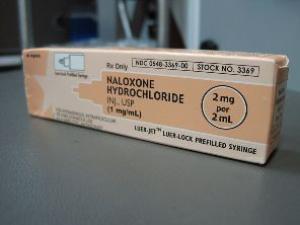Last week we reached out for help from Drug War Chronicle supporters to keep our newsletter at full strength in one of the most critical moments in the issue to date. Many responded, but your help is needed too.
President Obama has pardoned three marijuana offenders and commuted the sentence of a woman serving more than 20 years for a crack cocaine offense.
San Francisco distributes the opioid antagonist naloxone as a harm reduction measure to reduce overdose deaths. It's saved 600 lives in eight years.
Americans support medical marijuana even thought they are skeptical about how much use is actually medical, according to a new CBS News poll. And support for legalization is at 40%, lower than other recent polls.
Cops stealing dope from the evidence room, cops helping drug gangs, cops doing drug rip-offs to help drug gangs. Just another week of drug war law enforcement corruption.
A man gets shot and killed in a drug raid and a young woman dies after trying to hide drugs inside her body. They are the 43rd and 44th persons to die in US domestic drug enforcement operations so far this year.
A Houston-area drug stakeout turned into a deadly melee when hijackers attempted to rip off a drug-laden truck deputies had under surveillance.
The Copenhagen city council has advanced a plan to create a system of legal, regulated marijuana sales, but it will require approval by the Danish parliament.
Dear
StoptheDrugWar.org reader:
Last week I reached out for help from you and other supporters for the
Drug War Chronicle newsletter. You can read a copy of that email on our web site
here.
Since I sent that letter, members have donated over $5,000 to help us keep Drug War Chronicle operating at full strength. Thank you!
If you've been following our newsletter, then you know that the fight to stop the drug war has entered its most critical moment to date: Support for marijuana legalization has reached 50 percent. Heads of state including the current presidents of Mexico and Colombia have called for alternatives to drug prohibition to be considered. Leading civil rights groups have called for an end to the war on drugs in its current form. And yet -- and yet -- the federal government under President Obama has escalated its campaign to crush California's medical marijuana industry to its broadest and most aggressive level yet.
Do you agree with me that despite the troubled economy and the hit it's taken on nonprofits everywhere, that this is not a time to downsize the effort, this is a time to fight harder than ever? Will you make a donation today for the Chronicle and StoptheDrugWar.org?
Last week I shared some testimonials from activists who got involved in drug policy because of
Drug War Chronicle or use it in their work. But the Chronicle reaches over a million people per year, on our web site alone, and the web site over two million. So this week I'm sharing some thoughts from readers on what the Chronicle's done for their thinking on the issue and how they use it to help others:
Your newsletter gives me the details on the 'other side of the fence' as I work for a law enforcement agency and all I hear/see is their side of everything.
I use your information to keep abreast of drug laws and initiatives and inform clients, prisoners, and prison activists. You provide a very valuable service for those involved in criminal defense and those assisting prisoners in appealing unjust sentences and convictions.
I am a university professor who teaches a criminal justice course concerning drug use/abuse trends, law enforcement issues, etc., and find the Drug War Chronicle an up-to-date source of solid information useful to me and/or my students. Even if one may disagree with some of the views presented, the Chronicle obviously tries to get the facts straight -- and does. It is an extremely valuable resource.
I am the father of two adults in their 20s and the grandfather of six very young children. I have used information from StoptheDrugWar.org as instructional material for them, as survival tools, and for my parents, both in their 70s, who thirst for the comfort that knowing the truth about the drug war provides. I am thankful as well for reliable data I have used in blogs, letters and readers' forums in various publications. Thank you!
I read the Drug War Chronicle every weekend. I spend my life working to defend those charged with drug crimes and your newsletter keeps me posted to advise other judges and district attorneys why decriminalization is the only way to proceed. The Drug War must end and you folks will lead the way.
There is more at stake right now in drug policy right now than I've seen at any time in my career, and we need your help to decide whether StoptheDrugWar.org and Drug War Chronicle can enter this historical moment at full strength and looking to grow. Will you step up today in meeting the needs of the times? Please make a generous donation to StoptheDrugWar.org -- non-deductible for our lobbying work, or tax-deductible for our educational work like Drug War Chronicle -- to help us enter the new year right.
Donations to our organization can be made online at http://stopthedrugwar.org/donate, or they can be mailed to: DRCNet Foundation (tax-deductible), P.O. Box 18402, Washington, DC 20036; or Drug Reform Coordination Network (non-deductible for lobbying), same address. (Contact us for information if you wish to make a donation of stock.)
Thank you for standing with us to stop the drug war's cruelties and meet the opportunity this time offers to make a brighter future. And don't get discouraged by the challenges our movement and the cause are currently facing: Time, and the truth, are on our side!
Sincerely,

David Borden, Executive Director
StoptheDrugWar.org
Washington, DC
http://stopthedrugwar.org
P.S. Reply to this email or use our contact form to send us your Drug War Chronicle testimonial!
back to top
The White House announced Monday that President Barack Obama had granted pardons to five people, including three whose offenses were marijuana-related, and commuted the sentence of a woman doing more than 20 years on a crack cocaine charge. As is the case with every administration, the White House provided no explanation for its choice of pardons.
The only recipient of presidential largesse who was still actually serving a prison sentence is Eugenia Marie Jennings of Alton, Illinois. She was almost halfway through a 22-year sentence for crack cocaine distribution when President Obama commuted her sentence. She will now be released in one month, but will still have to serve eight years of probation. Jennings's brother, Cedric Parker,
testified before the House Judiciary Committee in 2009.
This is the third set of clemencies issued by President Obama. Each of the earlier sets also included at least one drug offender. So far, President Obama has pardoned or commuted the sentences of 23 people.
The number of clemencies issued by President Obama is
small so far compared to other presidents. George W. Bush pardoned or commuted the sentences of 200 people, while Bill Clinton pardoned 459. Other presidents have also pardoned hundreds of people during the course of their terms.
The marijuana offenders pardoned Monday were:
- Lesly Claywood Berry Jr. of Loreto, Kentucky, pardoned for 1988 convictions in federal court in Minnesota for conspiracy to manufacture, possess with intent to distribute, and distribute marijuana. He had done three years in federal prison.
- A second Kentucky man, Ricky Dale Collett of Annville, pardoned for a 2002 conviction in federal court in his home state for aiding and abetting a 61 plant marijuana grow. He had done a year's probation and two months home detention.
- Dennis George Bulin of Wesley Chapel, Florida, pardoned for a 1987 conviction in federal court in Alabama for conspiracy to possess with intent to distribute in excess of 1,000 pounds of marijuana. He had done five years probation and paid a $20,000 fine.
The other two pardons were of an Illinois man convicted of stolen property offenses and a Tennessee man with a federal gambling conviction.
back to top
For the past eight years, the San Francisco Department of Public Health has been handing out the opioid antagonist naloxone (Narcan) in a bid to reduce heroin overdose deaths. This week, the city marked what it said was the 600th life saved by using the overdose-reversal drug.

This drug stops heroin overdoses -- 600 so far in San Francisco (wikimedia.org)
The city distributes
naloxone through needle-exchange sites, nonprofit organizations, and community organizations that deal with injection drug users. The department also prescribes the drug to people in residential hotels and the friends and families of heroin users, and conducts training sessions in the county jail.
Not only have hundreds of overdose deaths been averted, but the department also reported that heroin-related visits to the city's emergency rooms had declined by half between 2004 and 2009.
The lifesaving measure is funded by a department expenditure of $73,000 a year, which goes to the Oakland-based
Drug Overdose and Prevention Education Project (DOPE Project). DOPE uses the money to buy and distribute the drug and train people on how to use it.
"San Francisco has always been a heroin town," Alice
Gleghorn,
DPH's head of Community Behavioral Health Services told the
SF Weekly. "At one time, San Francisco had an overdose death every day, and that rate has really gone down. I hope our
naloxone programs have contributed to that drop. But we don't have the money to do the research."
Eliza Wheeler, director of the DOPE Project, compared
naloxone to insulin and said its use posed few problems for injection drug users. "The folks we see are pretty adept with administering drugs, so they'll be okay. People are very capable and willing to save their friends' lives... my experience is that people are really proud of themselves," Wheeler said.
Harm reduction is saving lives in San Francisco. Perhaps other cities and counties should take heed.
back to top
A CBS News poll has found strong national support for medical marijuana, but more people who want to maintain pot prohibition than want to legalize it. Some 77% of respondents said doctors should be allowed to prescribe marijuana for serious medical conditions, but only 40% said marijuana should be legalized.
The poll was conducted at the end of October by phone (both land line and cell) with 1,033 respondents. The margin of error is +/- 3% for the overall sample, larger for subgroups.
The poll asked "Should marijuana be legal or illegal?" and the slightest of majorities -- 51% -- said it should be illegal. The 40% who said it should be legal is a slight decline from previous CBS News polls, which had support at 41% in two separate polls in 2009 and 44% last year.
The CBS News poll is on the low side when it comes to support for freeing the weed. An
October Gallup poll had national support for legalization at 50%, and an
August Angus Reid poll had support at 55%. Also contrary to the CBS numbers, both Gallup and Angus Reid, as well as other pollsters, show support for legalization trending upward.
In the CBS News poll, only two demographics reported majority support for legalization: Liberals (66%) and 18-to-29-year-olds (52%). Men broke evenly on the issue, with 46% supporting and 47% opposing, but women were more likely to oppose legalization. Only 35% of women supported it, with 54% opposed.
The polling results on medical marijuana reflected strong support for making it available to the seriously ill, but also cynicism about what goes on under the rubric of medical marijuana. While support for medical marijuana is strong across every demographic, the poll found that just 31% thought pot sold under state medical marijuana laws was being used to treat seriously ill people. A majority (52%) said they thought it was being used for other reasons, including 40% of those who thought marijuana should be legal.
The polls continue to show marijuana legalization on the cusp of majority support. Some are a few points over 50%, some a few points under, some right there right now. Acceptance of marijuana has come a long way in the past few decades in every major poll (and for CBS News, up from 27% in 1979). We may not be quite over the top, but we're getting very close.
back to top
Cops stealing dope from the evidence room, cops helping drug gangs, cops doing drug rip-offs to help drug gangs. Just another week of drug war law enforcement corruption. Let's get to it:
In
Denville, New Jersey,
a Denville police officer was arrested on October 27 on charges he broke into the department evidence room and stole drugs. The arrest was not made public until late last week. Officer Eugene Blood, 38, is charged with official misconduct in the third degree, burglary and attempted burglary, theft of controlled dangerous substances, attempted theft of controlled dangerous substances and criminal mischief. Blood went down after a supervisor contacted county prosecutors with his suspicions that someone was pilfering from the evidence room. Blood is an eight-year veteran of the force.
In
Opa-locka, Florida,
an Opa-locka police captain was arrested November 17 on charges he used his official position to help a drug-dealing ring.
Capt. Arthur
Baloma, a 12-year veteran of the department, was among eight people charged in a four-count federal indictment. He and the others face various counts of drug distribution and conspiracy to distribute narcotics. The ring allegedly distributed Ecstasy and
oxycodone. No word yet on bail arrangements or further court appearances.
In Chicago,
two Chicago police officers were indicted November 18 on charges they provided stolen cash, guns, and drugs to leaders of the Latin Kings street gang. Officers Alex Guerrero and Antonio Martinez were among 21 defendants named in a federal indictment aimed at the gang. They are accused of ripping off drug dealers in fake drug busts in Rockford, Chicago, and Hammond and turning over the proceeds to the Latin Kings. The defendants in the indictment are accused of 75 illegal acts, including 19 murders, assaults, gun sales, and drug sales in Chicago, Northwest Indiana, Texas, and Mexico. Guerrero and Martinez are not named in the homicide counts, but are charged with conspiracy.
back to top
An Atlanta-area man was killed in a drug raid over the weekend, and a coroner's report shows that a pregnant Georgia teenager died after trying to hide drugs during a traffic stop earlier this year. Dwight Person and Megan Long become the 43rd and 44th persons to die during US domestic drug law enforcement operations so far this year.
In East Point, Georgia, an East Point police officer shot and killed Person during a Friday afternoon narcotics raid at a suspected drug house.
According to police, officers with the department's narcotics unit arrived at a home where they had previously purchased drugs. Seven people were inside.
"One of the people made a threatening move towards the officer and he ignored a verbal command to stop," said Lt. Chris Chandler. "Fearing for her safety, the officer fired one shot and hit the individual in the chest."
The victim, Dwight Person, was rushed to a local hospital, where he was pronounced dead. Police have not revealed whether they recovered any weapons or drugs, but they arrested seven people at the residence.
Person's mother,
Verdelle Person, told
My Fox Atlanta that her 54-year-old son was the father of two, a military veteran, and a gentle person. "Ain't no way in the world he would have fought with an officer. That's from the bottom of my heart. I'd stand on a stack of bibles. He wouldn't have fought no officer," she said. "He was a good hearted person. He was helping people and a lot of times I would tell him, you don't know those people. He said, mama they need help, the car broke down. He'd get out and help people anytime. That's the type of person he was. He wasn't an aggressive person, a mean person," said Person.
Person had just gone to visit his nephew at the address, family members said.
The Georgia Bureau of Investigation is now reviewing the shooting.
Person's killing has raised hackles in Atlanta, where police infamously shot and killed 92-year-old Kathryn Johnston in a botched 2006 drug raid, and where the killings of young black men by police, including
Joetavius Stafford, 19, who was shot and killed at a subway station October 15, have heightened police-community tensions.
Occupy Atlanta announced it was holding a protest march Monday against the "reckless and wanton police murders of fellow
Atlantans" and police brutality in general. "With each passing month, many of Atlanta's residents, especially its African-American population, feel increasingly targeted by police," the group said in a press release. "The police continue to kill because they do not face the consequences of their actions."
The second drug war death, that of Megan Long, actually occurred in September. Long was hospitalized after a traffic stop while traveling with her mother and boyfriend, first losing the fetus she was carrying on September 2, then dying herself two days later. But the cause of death, a methamphetamine overdose, was not revealed until last week, when
the coroner's office released a toxicology report.
According to Long's father, when Long, her mother, and her boyfriend were pulled over by police, Long's mother told her to hide a bag of meth, and she stuffed the drugs inside her vagina. Later that night, she began having seizure-like symptoms and died after being hospitalized.
In
another media report, Long's father elaborated: "They had got pulled over and she stuffed a quarter ounce insider her and when they got here they were going to take it back out, but there wasn't anything left but a bag."
No charges have yet been filed in Long's case, but both the Georgia Bureau of Investigation and the Murray County District Attorney's Office are looking into it.
back to top
A Houston area drug stakeout turned into a violent melee Monday, leaving one man dead and one suspect and one undercover sheriff's deputy wounded. The as yet unidentified dead man becomes the 45th person to die in US domestic drug law enforcement operations so far this year.

Harris County sheriff's deputies (hcso.hctx.net)
According to a
Houston Chronicle account relying on police sources, members of a multi-agency narcotics task force in northwest Harris County were watching a semi-trailer truck believed to contain drugs when several vehicles approached the semi and opened fire in an apparent bid to hijack it. The cops on the scene immediately began firing on the hijackers.
A man sitting in the cab of the semi was shot and killed during the fracas, the undercover sheriff's deputy was shot in the knee, and one of the hijackers was hit by a police car and injured after firing on police. A second sheriff's deputy was injured when his vehicle collided with an empty school bus as he raced to the scene.
Police at the scene refused to confirm that the dead man in the semi was a confidential informant. They also refused to identify the deputy who was shot because he was working undercover as part of a High Intensity Drug Trafficking Area task force.
A sheriff's department spokesman at the scene said he did not know what kind of drugs were in the truck, but he added that several arrests had been made. No word yet on any charges, though.
back to top
The city council of Copenhagen voted 39-9 Thursday night to set up a committee to explore how best to legalize and regulate the sale of marijuana in the Danish capital. The move is supported by Mayor Frank Jensen.

If the Copenhagen City Council has its way, hash buyers will no longer have to go to Christiania to score. (wikimedia.org)
After the committee makes its recommendations, the issue will go to the Danish parliament, where similar efforts have been blocked in the past, but some Danish politicians are saying this time could be different.
The council vote paved the way for the council's Social Affairs Committee to draft regulations making Copenhagen the first city in Europe to legalize marijuana sales. Holland's famous cannabis cafes operate in violation of Dutch law, but are allowed under a policy of "pragmatic tolerance."
While marijuana sales are quietly tolerated in Copenhagen's "hippie enclave" of
Christiania despite authorities shutting down its most brazen manifestations several years ago, possession and sale of the herb remain illegal under Danish law. Possession of even small amounts can lead to a fine of up to $705 or even jail time. Still, the Copenhagen pot market is strong and vibrant, with annual sales estimated at $275 million, most going to criminal gangs.
"We are thinking of perhaps 30 to 40 public sales houses, where the people aren't interested in selling you more, they're interested in you," said
Mikkel Warming, the councilman who heads the Social Affairs Committee. "Who is it better for youngsters to buy marijuana from? A drug pusher, who wants them to use more, who wants them to buy hard drugs, or a civil servant?" he asked in remarks reported by the
Telegraph (UK).
Warming said that while questions remained about how to implement a marijuana sales system, the Dutch model was not one he wanted to follow. "We want to make it a little bit more concrete what kind of decriminalization we want: should it be a public buying system, should there be an age limit?" Warming said. "We don't want an Amsterdam model. We want a way to make it legal to import or grow marijuana," so that criminal gangs don't profit it from it, he said.
The notion of legal, regulated marijuana sales has significant, but not unanimous support among the Danish political class, the
Copenhagen Post reported. Social Democratic councilor Lars
Aslan Anderson told the Post legalizing the trade would bring broad benefits and that there is a parliamentary majority that would approve it.
"It's better that the council distributes hashish and not criminals," he said. "I hope we get the opportunity to try a new policy because we can’t just continue the current prohibition strategy with hash which is very outdated."
But not everyone was on board. "We strongly urge Frank Jensen as the country's former justice minister to stop this crazy proposal," said former Copenhagen deputy minister Martin
Geertsen, a member of the conservative
Venstre Party.
And not even all the Social Democrats are on board. "We don’t want to make it easier to get hold of hash because then more people would use it and be worse off for it," said Social Democratic MP Ole
Haekkerup. "If you look at people who use hard drugs, two-thirds of them started with hashish," he claimed.
Still, legalizing marijuana in Copenhagen will be an item before the Danish parliament next year.
back to top







